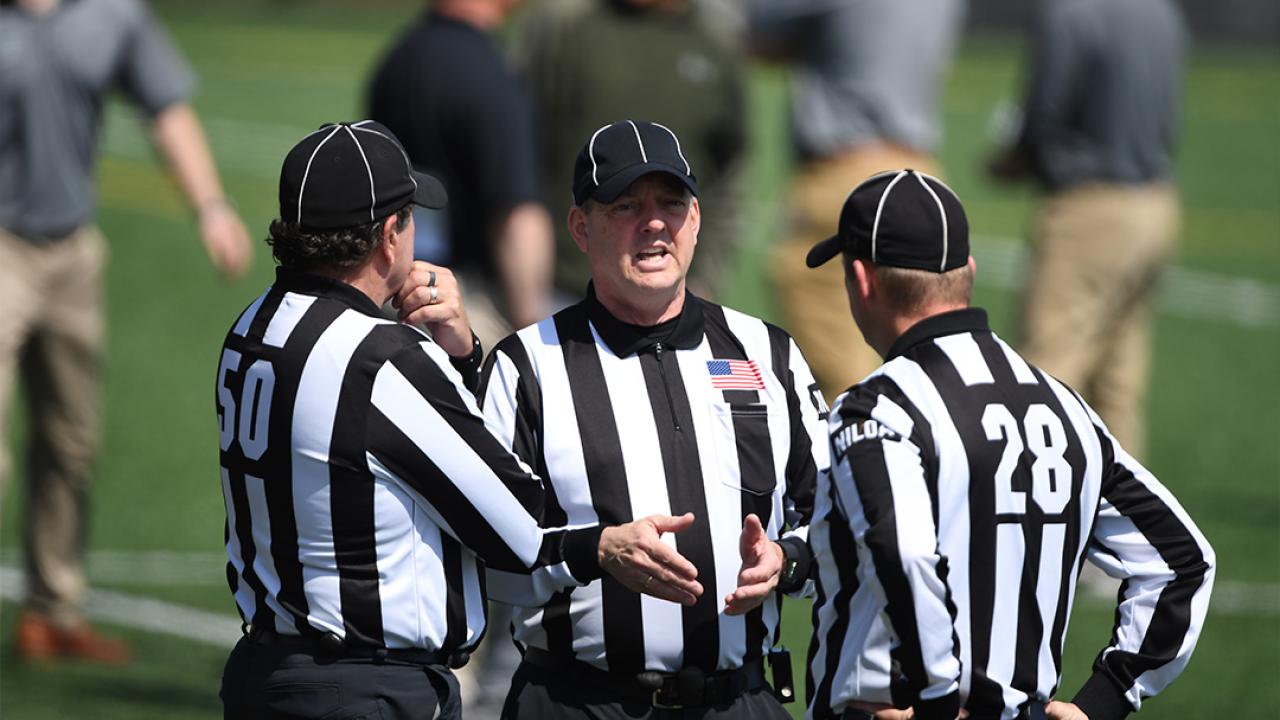
Game Ready: The Search for the Perfect Game
This article appears in the April edition of USA Lacrosse Magazine. Join our momentum. Marty Joyner is the manager of men’s officials development at USA Lacrosse and a veteran youth and high school referee.
Everyone has seen the controversial defensive holding call in the Super Bowl that ultimately made a difference at the end of the game. Were the officials correct? Yes. When you get a chance to look at the replay 100 times from 100 different angles, the call is easy.
Lacrosse officials don’t have that luxury. We make these calls in a split second on the field using our experience, judgment and vision to get them right.
Coming out of a long stretch of offseason tournaments, modified games and standards that are different than what’s expected in the spring, accountability becomes more of an issue for officials. Why? Because now the games really count. State and national championships are at stake. One of the great things about lacrosse is that the scholastic season is still the most important. But what does that mean for officials?
If we do our job, we put ourselves in the best position to make the correct call in every situation. Does that always happen? Of course not. Just like a coach or a player never plays a perfect game, officials miss calls.
Officiating is based in judgment. The principle of advantage disadvantage, or TPOAD, applies in many technical foul situations. In these cases, officials must determine in an instant, “Did the foul actually cause an advantage or disadvantage to the player?”
This is difficult to teach. You can show examples and discuss the situation, but ultimately, there is no substitute for game experience.
What should happen when you make a mistake? Personal accountability is the most effective form of accountability for any official.
PRE-GAME ACCOUNTABILITY
Nothing helps prepare you like a good pregame.
In college lacrosse, the preparation starts the week of the game with a two-hour in-person meeting at the game site. Officials review video, penalty histories and other technical data. At the high school level and below, many officials are just trying to get to the game in time after work. A pre-game routine may be only 5-10 minutes. Use this time to get your mind in the right space. Talk to your partner(s) about tough situations, when you will do stick checks and other pertinent game information.
Know the meaning of the game. Is it a rivalry, a playoff or an elimination game? Much of this work can be done in the days leading up to the game.
IN-GAME ACCOUNTABILITY
Know the rules. This sounds simple, but many obscure rules don’t permeate our minds until we make that mistake for the first time. Once it happens to us in a crucial situation during a game, then we never forget it.
How you respond to a mistake is important. Will it distract you for the next 15 minutes? Did you blow your chance? Will you never get a quality assignment again?
Here are some tips to manage the bad call:
Compartmentalize it. Put it in a box and come back to it when you have a chance to properly evaluate it. The rest of the game needs your full time and attention, lest you make another mistake because you’re distracted by the previous one. Use halftime or your postgame to discuss something that you might’ve done differently.
Don’t be afraid to admit to the coach you made a mistake or missed a call. A little self-deprecation can go a long way in your relationship with the coach. He may not be happy in the moment, but he will respect you for your ownership and personal accountability.
“Ref the game five minutes at a time.” Veteran official Rich Tamberino said this at a USA Lacrosse Convention several years ago and it’s one of the best pieces of advice I’ve ever received. In the college game, there are 15-minute quarters, he said. So that gives you 12 opportunities in a game to be perfect for five minutes.
POST-GAME ACCOUNTABILITY
If you made a major mistake in a game, you must inform your assignor. Don’t let the assignor get blindsided by a phone call from someone else.
For minor mistakes, your post-game accountability really comes down to two things: a good solid debrief with your crew and watching film.
Post-game debriefs can be difficult. After a late game on a weeknight, we just want to get home. Take time for a short meeting after the game and then a more detailed debrief by email, phone or some other form after the game.
The eye in sky don’t lie. When you see yourself on film, it really shows you what you may not be able to see in the moment. With some of the new filming hardware and software, there is a much wider view of the field and officials are more in the picture than they have ever been before. This has been one of the greatest tools for watching and teaching mechanics. Most coaches are willing to share film for self-improvement and they will remember that you asked. Some associations use tech platforms specifically to disseminate film to their officials.
Marty Joyner
Categories
Related Articles




